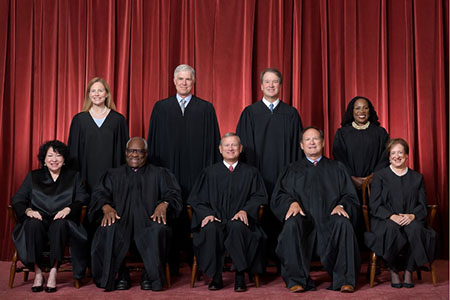by WorldTribune Staff, February 8, 2024
Supreme Court justices on Thursday voiced their skepticism in Colorado’s decision to remove former President Donald Trump from the state’s ballot for president under the insurrection clause (Section 3) of the 14th Amendment.
Chief Justice John Roberts said to the Colorado plaintiffs’ lawyer, Jason Murray, that “other states may have different views about what constitutes insurrection.” If ‘insurrection’ is defined differently by various states, then “we’d have to develop rules for what constitutes an insurrection.”

If the Colorado ruling is upheld, Roberts said “I would expect that a goodly number of states will say whoever the Democratic candidate is, you’re off the ballot, and others for the Republican candidate, you’re off the ballot.” If this were to occur, then the presidential election would be determined by “just a handful of states,” Roberts said. “That’s a pretty daunting consequence.”
Justice Clarence Thomas challenged Murray to provide any example of a state disqualifying a national candidate.
Murray stated that states have the power to run elections, but Thomas quickly offered a counterpoint.
“But would seem that — particularly after Reconstruction and after the Compromise of 1877 and during the period of Redeemers — that you would have that kind of conflict. There were a plethora of Confederates still around. There were any number of people who would continue to either run for state offices or national offices,” Thomas said, adding that this reality would “suggest that there would at least be a few examples of national candidates being disqualified.”
“Well, there were certainly national candidates who are disqualified by Congress refusing to seat them,” Murray responded. But Thomas pointed out that it is “not this case.”
“Other than the example I gave, no,” Murray admitted, adding that it was not surprising.
“What was the purpose of Section Three? States were sending people — the concern was that the former Confederate states would continue being bad actors,” Thomas said.
“And the effort was to prevent them from doing this and you’re saying that well, this also authorized states to disqualify candidates. So what I’m asking you for, if you are right, what are the examples?” Thomas asked again.
“Your Honor, the examples are states excluded many candidates for state office, individuals holding state offices. We have a number of published cases of states,” Murray responded before Thomas interjected.
“I understand the states controlling state elections and state positions. What we are talking about here are national candidates,” Thomas said, noting that there were people who “felt very strongly about retaliating against the South, the Radical Republicans, but they did not think about authorizing the South to disqualify national candidates, and that’s the argument you’re making.”
“And what I would like to know is, do you have any examples of this?” Thomas asked yet again.
Once again, Murray was unable to provide any examples.
Justice Ketanji Brown Jackson also pushed back against Murray, asking that if Section 3 of the 14th Amendment applies to presidents, then why didn’t Congress “put the word ‘president’ in the enumerated list in Section 3?”
She added, “they were listing people who were barred, and ‘president’ is not there. And so I guess that just makes me worried that maybe they weren’t focusing on the president.”
Justice Elena Kagan said: “I think that the question that you have to confront is why a single state should decide who gets to be president of the United States. In other words, you know, this question of whether a former president is disqualified for insurrection to be president again, is, just say it, it sounds awfully national to me. So whatever means there are to enforce it would suggest that they have to be federal, national means.”
Trump’s legal counsel, Jonathan Mitchell, argued that a state cannot prevent Trump from being on a ballot regarding the insurrection clause of the 14th Amendment because Congress would have to prevent an elected candidate from taking federal office.
“A state cannot exclude any candidate for federal office from the ballot on account of Section 3, and any state that does so is violating the holding of term limits by altering the Constitution’s qualifications for federal office,” Mitchell said.
During a press conference from Mar-a-Lago on Thursday, Trump said: “I thought the presentation today was a very good one. I think it was well received – I hope it was well received.”
Supreme Court Justice Clarence Thomas EVICERATES Colorado attorney Jason Murray during Donald Trump’s 14th Amendment hearing at SCOTUS.
Thomas – “What are the examples?”
Murray – Provides no examples.
Thomas – “Do you have any examples of this?”
Murray – Still no examples. pic.twitter.com/fkiRvkKnvb
— Conservative Brief (@ConservBrief) February 8, 2024
Quality Resource for Citizen Journalists
